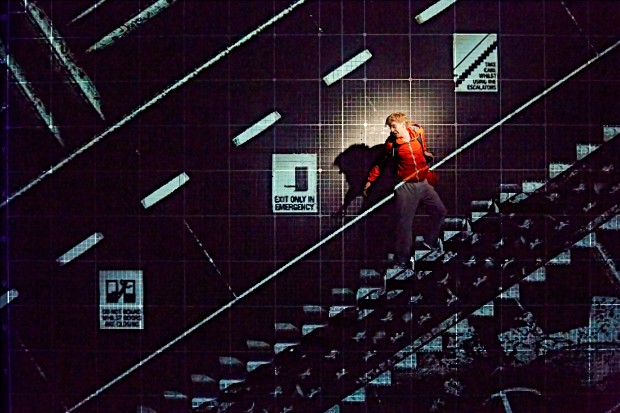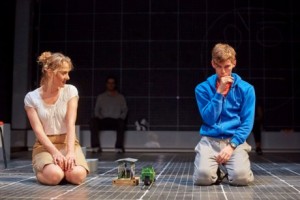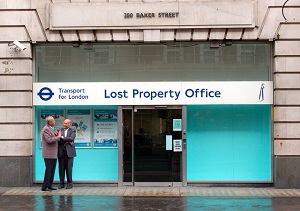You have no items in your cart. Want to get some nice things?
Go shopping
The Curious Incident of the Dog in the Night-Time hurtles towards you at a rate of knots, rather like the tube train that marks protagonist Christopher’s first lone adventure in the terrifying big-wide world. This is a production that lays everything out bare on a stark stage, serving as the perfect cross between classroom and playground. The characters themselves become part of the set, appearing through unexpected doors in the walls of a massive, blackboard-like canvas (designed by the ever-imaginative Bunny Christie). We may regularly catch a glimpse of the supporting actors sitting patiently around the sides of the stage, but they’re never permitted to stay still for long. There’s a whole world to create here – the world within protagonist Christopher’s head – and director Marianne Elliott, with help from the aptly named Frantic Assembly’s Scott Graham and Steven Hoggett, does all she can to give that world a frenetic, often bewildering rhythm.
The play is adapted from Mark Haddon’s brilliant novel of the same name, which takes a deeply personal look at a precocious young man with Asperger Syndrome, observing the problems he faces when dealing with everyone and everything around him. Haddon provides an unflinching account of Christopher’s thought processes, especially powerful and affecting for the use of a first-person narrative. How do you translate that for the stage? Adapter Simon Stephens (a respected playwright, though one whose own writing I don’t have time for in general) and Elliott have a number of solutions, and a varied success rate in realising them. Firstly there’s teacher Siobhan, played by Niamh Cusack, who here takes on not only the role of guiding hand for Christopher but also that of narrator. Poor Cusack has the thankless task of making her already rather shrill voice heard above a barrage of mechanical noise and extremely impressive special effects, reciting extracts lifted from Haddon’s novel. As with much of Stephens’ work (the current production of Port at the National Theatre a glaring example), he bombards us with expositional details and tells us a great deal of things that could be shown more effectively with greater subtlety. Why can’t we find out about Christopher’s anxieties and quirks for ourselves, rather than having them spelt out so bluntly to us?

It’s safe to say that this show hits its peaks when the script itself takes a back seat. Fortunately the play is blessed with a committed, incredibly brave performance from Luke Treadaway (understandably doubled up with Johnny Gibbon) as Christopher. The young actor is required to convincingly depict an enormous range of emotions and behaviour, while also tackling some challenging choreography and battling against the aforementioned technical wizardry all around him. He does himself enormous credit by keeping the audience engaged, and on side, for the entire evening – as evidenced by the rapturous applause and standing ovation he receives during the curtain call. Despite the obliqueness of some of his character’s actions, Treadaway confidently navigates all of the coping strategies employed by a young man with big dreams and a fierce intelligence, who refuses to let his condition stand in his way.
As someone with mild Asperger Syndrome myself, Christopher’s story was always going to speak to me. But in this stage version, I found my strongest emotional connection was with the character of Christopher’s mother Judy. In a spirited performance from Holly Aird, the tale of a parent tragically unready to care for a disabled child unfolds initially as a series of letters. It’s a part that necessitates long, sprawling monologues, and is expertly judged by Aird so as to capture our attention and hold it. Throughout the performance we are in turns critical of and sympathetic towards her. The same can be said of Seán Gleeson, who invests Christopher’s father Ed with a caring warmth that is otherwise missing from the character in the book. Crucially, these are real people, with all their foibles and failings, painted with somewhat broad strokes by Stephens but nevertheless believable and well-acted.
It would be unfair not to mention the consistently entertaining and dedicated ensemble who provide sturdy support for the family unit at the centre of the narrative. They do a lot of work to keep the pace slick and fluid, and really seem to relish the potential for comedic reactions in such bit-parts as “Man with Socks” and “Lady in the Street”. Sophie Duval’s wickedly funny headmistress Mrs Gascoyne in particular often threatens to steal the show. Most importantly, these performances keep things exciting when the play’s energy starts to flag. The overall high standard of this production speaks volumes about the cast and crew’s passion for what must have seemed a daunting project: the translation of a work heavily reliant on introspection into a powerful piece of visually striking drama.
A Curious Incident of the Dog in the Night-Time is performing at the Apollo Theatre on Shaftesbury Avenue until the 31st August 2013.

About Michael Reffold
Michael is a graduate of Lancaster University, with a Master's in European Languages and Cultures following swiftly on from a BA in English Literature and Creative Writing. He loves all aspects of theatre – both watching and performing, being a keen amateur actor. He is currently a Senior Editorial Assistant at BioMed Central and a casual duty manager for Theatres Trust.




